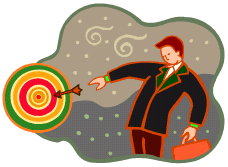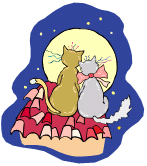| 英語喫茶〜英語・英文法・英会話〜 |
| <前の英会話ページへ> | <英会話インデックスへ> | <次の英会話ページへ> |
|
|
 |
 〜 続く主人の挑戦 〜 〜 続く主人の挑戦 〜  ―Sherry and Pina were sitting beside the pond in the campus. Two cats were talking with each other. We can see several students around the pond. Two students were sitting on a bench and the others were walking around the pond.― “These days Rickey is in the habit of saying.” “What is he saying?” “How should I invite Bellini?” “Really?” “Why don't you go to the International Center?” I said. “Bellini will be there.” “Rickey will probably be there. I don't know whether he is now back in the office or not. Anyway, I want to go there.” ―At the International Center. In the hall several overseas students were talking. There were a few lecturers, too. We can see Bellini and Rickey among them. They were talking with each other as they stood. Sherry and Pina sat beside them.― It seemed Rickey can't invite Bellini yet. “This has nothing to do with anything but what kind of food do you like?” Rickey asked Bellini. You broached it finally, Rickey. “I like an Italian food.” “Me, too. What else do you like?” “I like a Japanese food, too. But my favorite food is an Italian food. Do you have a point?” |

|
<今日の単語> in the habit of saying 口癖 broach 切り出す、持ち出す |

|
<今日の日本語訳> ―大学の池の側にはシェリーとピーナが座っていた。2匹はお互いに話をしている。池の周りには数人の学生の姿も見える。2人がベンチに座っていて、あとは池の周りを歩いていた。― 「リッキーは最近口癖になっていることがあるんだ。」 「どんな口癖?」 「どうやったらベリーニを誘えるかな。」 「本当に?」 「国際センターに行ってみようか?」と僕は言った。 「ベリーニはいると思うけれど。」 「リッキーもたぶんいるんじゃないかな。それとも研究室に戻ったか。とにかく見に行ってみたいな。」 ―ここは国際センター。ホールには数人の留学生がいて話をしていた。何人かの講師の姿もある。その中にベリーニとリッキーの姿もあった。2人は立って話をしていた。その側にはシェリーとピーナも座っていた。― リッキーはまだベリーニを誘えていないようだ。 「そういえば、ベリーニはどんな料理が好きですか?」とリッキーがベリーニに話した。 とうとう切り出したか、リッキー。 「イタリア料理なんて好きですけれど。」 「僕も好きですよ。他には何が好きですか?」 「日本の料理もいいですね。けれども一番好きなのはイタリア料理かな。それがどうしたの?」 |

|
<今日の日本語訳&英語訳> ―大学の池の側にはシェリーとピーナが座っていた。2匹はお互いに話をしている。池の周りには数人の学生の姿も見える。2人がベンチに座っていて、あとは池の周りを歩いていた。― ―Sherry and Pina were sitting beside the pond in the campus. Two cats were talking with each other. We can see several students around the pond. Two students were sitting on a bench and the others were walking around the pond.― 「リッキーは最近口癖になっていることがあるんだ。」 “These days Rickey is in the habit of saying.” 「どんな口癖?」 “What is he saying?” 「どうやったらベリーニを誘えるかな。」 “How should I invite Bellini?” 「本当に?」 “Really?” 「国際センターに行ってみようか?」と僕は言った。 “Why don't you go to the International Center?” I said. 「ベリーニはいると思うけれど。」 “Bellini will be there.” 「リッキーもたぶんいるんじゃないかな。それとも研究室に戻ったか。とにかく見に行ってみたいな。」 “Rickey will probably be there. I don't know whether he is now back in the office or not. Anyway, I want to go there.” ―ここは国際センター。ホールには数人の留学生がいて話をしていた。何人かの講師の姿もある。その中にベリーニとリッキーの姿もあった。2人は立って話をしていた。その側にはシェリーとピーナも座っていた。― ―At the International Center. In the hall several overseas students were talking. There were a few lecturers, too. We can see Bellini and Rickey among them. They were talking with each other as they stood. Sherry and Pina sat beside them.― リッキーはまだベリーニを誘えていないようだ。 It seemed Rickey can't invite Bellini yet. 「そういえば、ベリーニはどんな料理が好きですか?」とリッキーがベリーニに話した。 “This has nothing to do with anything but what kind of food do you like?” Rickey asked Bellini. とうとう切り出したか、リッキー。 You broached it finally, Rickey. 「イタリア料理なんて好きですけれど。」 “I like an Italian food.” 「僕も好きですよ。他には何が好きですか?」 “Me, too. What else do you like?” 「日本の料理もいいですね。けれども一番好きなのはイタリア料理かな。それがどうしたの?」 “I like a Japanese food, too. But my favorite food is an Italian food. Do you have a point?” |
|
|
ここからは今日のポイントになります。 |
 |
  ★ポイント1 “This has nothing to do with anything but what kind of food do you like?” Rickey asked Bellini. 「そういえば、ベリーニはどんな料理が好きですか?」とリッキーがベリーニに話した。 What kind of food do you like? で、「どんな種類の食べ物が好きですか?」という意味になります。 What kind of 〜? で、「何の種類の〜」という意味で使うことができます。 I went to see the movie yesterday. (昨日私は映画を見に行きました。) What movies did you see? (何の映画を見たのですか?) I saw ‘The Lord of the Rings'. (私は「ロードオブザリング」を見ましたよ。) Oh, it's a fantasy, isn't it? (それはファンタジーですよね?) Yes, I like a fantasy movie. What kind of movies do you like? (はい、私はファンタジーが好きです。あなたはどんな種類の映画が好きですか?) I'd rather like a suspense movie. (私はサスペンス映画のほうが好きですね。)  ★ポイント2 “Me, too. What else do you like?” 「僕も好きですよ。他には何が好きですか?」 Me, too. は「私もそうです。」というように、相手に同調して言うときに使うことができます。 ただし、Me, too. は相手が肯定的に言ったことに対して使うことができます。 もしも相手が否定的なことを言ったのなら、Me, too. の代わりに Me, neither. を使います。 Do you like noodle? (ラーメンは好きですか?) Yes. (はい。) What kind of noodles do you like? (何のラーメンが好きですか?) I like a soy sauce. (私はしょうゆが好きです。) Me, too. (私もそうですよ。) Do you like noodles? (ラーメンは好きですか?) Yes. But I don't like miso. (はい。けれどもみそ味は嫌いです。) Me, neither. (私もそうですよ。)  ★ポイント3 “I like a Japanese food, too. But my favorite food is an Italian food. Do you have a point?” 「日本の料理もいいですね。けれども一番好きなのはイタリア料理かな。それがどうしたの?」 Do you have a point? で「それがどうしたの?」や、「何が言いたいのですか?」のように相手に対して使うことができます。 I worked every Sunday and I've worked overtime for a month. (私は毎週日曜日に働いています。それに1ヶ月間残業もしています。) So, do you have a point? (何が言いたいのですか?) Could you give me a holiday? (私に休みをくれませんか?)  |

|
<今日のメモ> You broached it finally, Rickey. とうとう切り出したか、リッキー。 broach には「(話を)切り出す」という意味があります。 break the ice にも同じ意味があります。 |
|
|
 |
| <前の英会話ページへ> | <英会話インデックスへ> | <次の英会話ページへ> |
| Copyright(c) 2004- 英語喫茶〜英語・英文法・英会話〜 : サイト内の文章・図の無断掲載を禁じます |